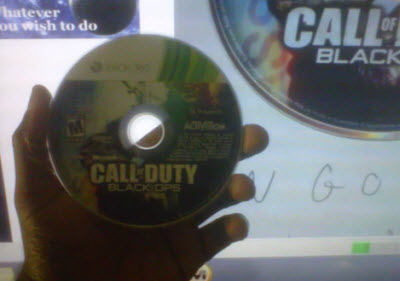
But instead of busting them and turning them over to the FBI, the investigators are trying a different tactic. They’re approaching the pirates and telling them to please stop selling illegal copies of the game.
[aditude-amp id="flyingcarpet" targeting='{"env":"staging","page_type":"article","post_id":221216,"post_type":"story","post_chan":"none","tags":null,"ai":false,"category":"none","all_categories":"business,games,security,","session":"D"}']One of the people who bought a disk online has even posted a four-part video on YouTube describing his experience (part one of BlackGate is posted below) of buying a game and getting caught. He described the investigator who cornered him as “polite.”
The tactics are different from those used by the Recording Industry Association of America, the organization that represents music labels, in cracking down on music pirates. The RIAA’s tactics are much tougher, and the organization has been vilified for going after music fans. Activision Blizzard, which employs the IP Cybercrime investigation firm, has opted to issue warnings first. Activision Blizzard got lots of bad press when it broke up with the founders of the Call of Duty franchise at its Infinity Ward game studio. It probably doesn’t want to aggravate its own fans further. (I’ve emailed Activision Blizzard for comment).
AI Weekly
The must-read newsletter for AI and Big Data industry written by Khari Johnson, Kyle Wiggers, and Seth Colaner.
Included with VentureBeat Insider and VentureBeat VIP memberships.
It isn’t clear if this ask-nicely tactic will work. Black Ops pirated copies leaked out during the past week, even though the game doesn’t go on sale on all platforms until Nov. 9. The game is in the process of being duplicated, packaged, and sent to stores. Rob and Jason Holmes of IP Cybercrime noticed that the pirated Xbox 360 games began appearing first in the South at college towns such as the University of Mississippi in Oxford, Miss., and in locations in Alabama and Georgia.
Rob Holmes considered it important to head off the piracy before it spread around the globe. His team moved in quickly. One way they can identify pirates is by seeing them play the game online on the Xbox Live online gaming service. Microsoft can easily spot those playing a game before its release. It turns over the identification of those players to Activision Blizzard, which hands it to its investigators. Those investigators can take the data and track down a real person.
“We know that a couple of leaks start and then it can spread like crazy,” Holmes said.
Last year, the crackdown was tougher. Holmes’ IPCybercrime firm tracked down pirates who took a shipment of games at a retail store and sold them on eBay. They then tracked down a pirate who had bought one of the disks and began selling bootlegged copies on the web, more than a week before the game went on sale. By tracking the web site and the user’s presence on Facebook, investigators managed to locate a pirate in Miami. The cops busted the operation, and the pirate was arrested and ultimately sentenced to probation.
It’s not clear that piracy took a huge toll on game sales last year. Modern Warfare 2 went on to sell more than 20 million units. But catching the pirates before they set up operations early in the days before the launch was considered critical to ensuring a good launch.
[aditude-amp id="medium1" targeting='{"env":"staging","page_type":"article","post_id":221216,"post_type":"story","post_chan":"none","tags":null,"ai":false,"category":"none","all_categories":"business,games,security,","session":"D"}']
This year, Holmes’ team noticed chatter on Craig’s List, piracy web sites and Facebook pages about offers to sell bootleg copies of Black Ops. The team’s investigators set up sting operations, meetings with the pirates in coffee shops and other places. They then asked the pirates to stop selling and to tell them where they got their wares. Most of the pirates were scared, surrendered their game copies and cooperated.
Some of the situations reflect a profound ignorance about piracy. One user posted on a web site, saying he had a copy of the game and wanted to learn how to make a copy.
In the BlackGate video below (note: it includes foul language; the video is linked to more related videos), a New Orleans-based YouTube user named 504Ghostmaker (who calls himself Computer Healer) said he had a copy of Black Ops.
[aditude-amp id="medium2" targeting='{"env":"staging","page_type":"article","post_id":221216,"post_type":"story","post_chan":"none","tags":null,"ai":false,"category":"none","all_categories":"business,games,security,","session":"D"}']
Back on Oct. 18 or thereabouts, he said he got a tweet from someone saying they had a copy of the game. On a forum, a thread of comments mentioned it was for sale. Computer Healer replied to the message, presumable via instant message, and offered $150 for the game, which the seller wanted $400 for. Others began offering donations to buy the copy collectively. Computer Healer offered to pick the game up himself. He arranged a deal with a guy named Ungodly and met at a Chili’s restaurant.
“I never made a copy of the game. I never said I was going to leak this game,” Computer Healer said in the video. “Was I going to give a copy to my friends? Yes…. I wanted to play my game…. The best game I ever played….I wouldn’t have sold the f****** for a million dollars.”
Computer Healer said the next call he got was from a very polite investigator, who said they would send a courier to pick up the game so it could be returned to the company. Computer Healer said he promised to return the money of others who donated to help purchase the copy of his game. In his final video, Computer Healer said he returned the game.
[aditude-amp id="medium3" targeting='{"env":"staging","page_type":"article","post_id":221216,"post_type":"story","post_chan":"none","tags":null,"ai":false,"category":"none","all_categories":"business,games,security,","session":"D"}']
“This was a good moral lesson,” he said. “You can’t trust people in real life, and you can’t trust people online.”
VentureBeat's mission is to be a digital town square for technical decision-makers to gain knowledge about transformative enterprise technology and transact. Learn More